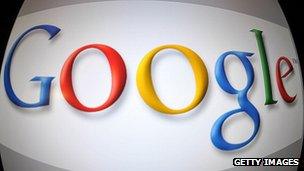Google - good or evil?
- Published
- comments

It is a hugely profitable company that still likes to see itself as a benign organisation dedicated to good works. But Google is finding that the rest of the world is now rather more cynical about its morals.
In the last few days the search behemoth's good intent has been questioned - by a small Kenyan online business directory, and by the world's most powerful media mogul.
And it is the charges laid by Kenya's Mocality which will really hurt at Google's HQ, where they still insist that "don't be evil, external" is a corporate mantra that is more than just window-dressing.
In a long blog post on Friday, external, Mocality's CEO Stefan Magdalinski, who came to Kenya from the UK 18 months ago, explained that the company had been getting some strange calls from its customers wanting help with their websites. Which was confusing as Mocality doesn't offer websites, just directory listings.
A forensic investigation revealed that the customers had been called by Google's Kenyan operation GKBO, whose agents then tried to trick them into signing up to the search firm's rival service. Mocality then mounted a sting to record calls from the Google agents, in which they appeared to claim the two firms worked together, and also made inaccurate statements about the Kenyan firm's charges.
Here is how Mr Magdalinski concludes: "Since October, Google's GKBO appears to have been systematically accessing Mocality's database and attempting to sell their competing product to our business owners. They have been telling untruths about their relationship with us, and about our business practices, in order to do so. As of January 11th, nearly 30% of our database has apparently been contacted."
That Google should be trying to sell services to Mocality's customers may not be surprising. But that its staff should do so in such an underhand way looked unethical - or plain evil - to many who read the blog post and commented on social networks.
When I contacted Google I half expected the whole story to be dismissed as inaccurate or a misunderstanding. But no, within a few hours, the company's vice-president for product in Emerging Markets, Nelson Mattos, issued what amounted to an abject apology:
"We were mortified to learn that a team of people working on a Google project improperly used Mocality's data and misrepresented our relationship with Mocality to encourage customers to create new websites. We've already unreservedly apologised to Mocality. We're still investigating exactly how this happened, and as soon as we have all the facts, we'll be taking the appropriate action with the people involved."
Google says it is still investigating exactly what happened, and it is a very serious issue. There is a hint in the statement - "a team of people working on a Google project" - that contractors rather than its own staff may have been involved. Even if that is the case, the whole incident shows how hard it is for a fast growing business to impose a moral code on everyone who represents the brand.

The other attack on Google's reputation came from Rupert Murdoch. In a series of tweets, external over the weekend the News Corp boss accused the firm of aiding and abetting piracy - and the US president of siding with them. Here are a few of the messages:
"So Obama has thrown in his lot withSilicon Valley paymasters who threaten all software creators with piracy, plain thievery."
"Piracy leader is Google who streams movies free, sells advts around them. No wonder pouring millions into lobbying."
"Just been to google search for mission impossible. Wow, several sites offering free links. I rest my case."
The context is the battle in the United States over Sopa, Stop Online Piracy Act. That has pitted Hollywood and the media industries, who say the act will finally give them protection against online theft, against Silicon Valley, where firms like Google see Sopa as a serious assault on internet freedom. Last week, comments from the Obama administration made it clear that the White House has serious issues with the act, which may now struggle to get through congress.
So how will Google feel about this attack by Mr Murdoch? Not too worried, is my guess. The online crowd which has expressed horror over its behaviour in Kenya, is far more exercised about stopping Sopa. In this battle, Google is seen by web libertarians as being on the side of the angels. If it joins the web blackout threatened by some firms this week, they will love it even more.
Mocality and Murdoch both believe they have found something evil about Google. But the search firm may well be more concerned to repair its reputation with the small Kenyan business than with mighty News Corp.